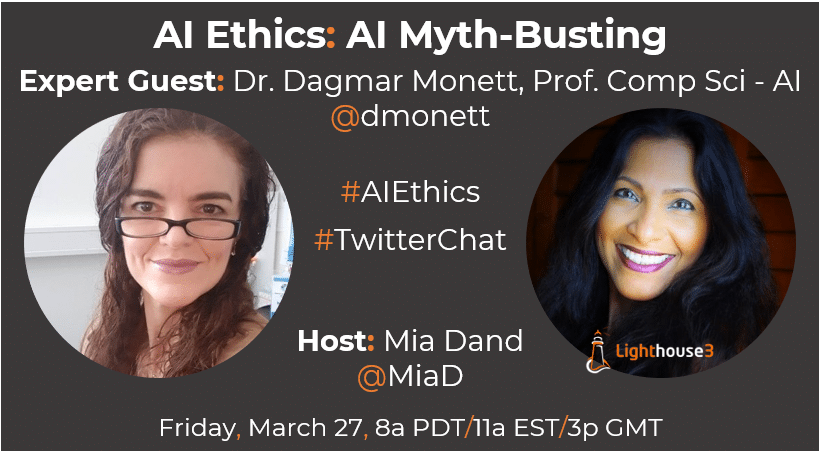
For our March AI Ethics Twitter chat, we took a brief break from the pandemic for an insightful discussion on the reality vs. myths in AI with our expert guest, Dr. Dagmar Monett, professor of Computer Science/Artificial Intelligence at the Berlin School of Economics and Law. Here’s a summary of our chat.
#1 Fact or Fiction? Artificial Intelligence (AI) is the same as Machine Learning or Deep Learning.
Deep Learning is a family of a particular case of Machine Learning (ML) methods. ML is a subset of, part of AI. ML and especially Deep Learning have attracted much attention in recent years and are often mistaken as “the only” AI. They are not. There are *many* AI sub-fields, concepts, paradigms, methods *other than* ML & DL E.g.: Knowledge representation and reasoning, Problem-solving, Planning, Motion, manipulation, perception (intercepting w/ Robotics), etc.
Metaheuristics *other than* Neural Networks are also considered part of AI. Classic metaheuristics are: Evolutionary Computation, Simulating Annealing, Tabu Search, Neural Networks, among others. Most published work on metaheuristics up to ’04 (time I wrote my PhD thesis on these topics) was in Evolutionary Computation (e.g. Genetic Algorithms, Evolution Strategies, Genetic Programming) followed by NN. Today it’s the other way around!
#2 Fact or Fiction? AI is less racist than humans.
AI can be as racist as humans are. Human biases & prejudices, conscious or unconscious, are present in data, developers, programs they code, even in the users. Algorithms are not neutral, they could carry those biases too, just a different dimension.
#3 Fact or Fiction? Artificial General Intelligence (AGI) or human like intelligence is already here.
AGI or human-like intelligence already here? Not at all! Computer programs & systems that can solve problems in very narrow domains is what we have. I refer to Rodney A.Brooks’ excellent analysis and predictions for more: http://rodneybrooks.com/predictions-scorecard-2020-january-01/
Re: AGI & human-level AI, let me cite Wang https://content.sciendo.com/view/journals/jagi/10/2/article-p1.xml
“These new labels carry a common message: as ‘AI’ no longer means what it used to mean within mainstream AI, a new brand is in need, even though what it refers to is not really new”
Which brings me to Raúl Rojas’ distinction in https://content.sciendo.com/view/journals/jagi/11/2/article-p1.xml “Human intelligence is based on pattern recognition, intuition and filtering of unnecessary details. Computer intelligence is based on fast electronics and optimal algorithms.”
Wang also says that AGI “is not proposed as a competing tool to any AI tool developed before, by providing better results, but as a tool that can be used when no other tool can, because the problem is unknown in advance.” https://content.sciendo.com/view/journals/jagi/11/2/article-p1.xml
#4 Fact or Fiction? AI is more efficient than humans.
AI is more efficient than humans in some tasks. Computer power should not be underestimated. It’s one of the reasons AI and Machine Learning in particular have flourished in the last years.
More efficient doesn’t mean more intelligent, though. More efficient algorithms doesn’t mean they are fearer, either.
Nor more robust. Nor more able to cope with unforeseen circumstances or events as humans do. AI is not a silver bullet for all kinds of problems.
#5 Fact or Fiction? Deep learning is better than other heuristic or non-neural methods.
Deep Learning has had a renascence and broad attention not only by AI experts, but it is only as better as other approaches (e.g. metaheuristics like Evolutionary Computation-based methods) are slower to keep up w/ the pace (and get attention too).
Even different Machine Learning techniques have proven to be more suitable for certain kinds of problems than others. Some are good for voice recognition; others for image recognition or for written language. It depends to a large extent on the data.
I remember conferences very well (late 90’s & early 2000’s) where there was a constant “battle” among different metaheuristics. “Neural Networks are better here!” “Evolutionary algorithms are better there!” “Ant Colony systems are better over there!”
Historically, hybrid AI approaches have proven to be more powerful than pure ones.
E.g. local search methods have been successfully combined with other mechanisms; evolutionary methods have been used to optimize Neural Networks architectures, etc.
Unfortunately, some AI silos and their followers (it happens also in other fields, BTW) are still sending the wrong signal and selling Deep Learning as the unique, only option to AI-powered solutions.
They can’t see farther than their noses.]
#6 Fact or Fiction? More accuracy will make AI more ethical.
More accurate algorithms, more computation, more efficient calculations won’t lead to a more ethical AI per se.
But ethics and moral judgment could to some extend be put into AI programs and help humans in decision making.
#7 Fact or Fiction? More explainability will make AI more ethical.
There is a lot of open Q’s and research that needs to be done regarding explainable AI
Yet, I am certain explainable algorithms will play decisive roles in ethics & users’ use & acceptance of any algorithm or system, either AI based or not.
Two surveys on explainable AI worth reading:
Explainable Artificial Intelligence: A Survey https://academia.edu/36711495/Explainable_Artificial_Intelligence_A_Survey
A Survey on Explainable Artificial Intelligence (XAI): Towards Medical XAI https://arxiv.org/abs/1907.07374
#8 Fact or Fiction? Training humans to be ethical will make AI more ethical.
Absolutely!
Humans are responsible for the data they collect, algorithms they code, programs they use, systems they control, decisions they make.
Books like @vdignum’ Responsible AI https://springer.com/gp/book/9783030303709 are a must on these topics.
According to EU Ethics guidelines for trustworthy AI (https://ec.europa.eu/digital-single-market/en/news/ethics-guidelines-trustworthy-ai) such programs should be ethical, i.e. respect ethical principles and values.
We, humans, are the ones that define, represent, and code those values into the machines.
***
Hope you found our discussion helpful in separating fact from fiction in AI.
Join us again on Sunday, April 26, 11a PDT/2p EDT/6p GMT for #AIEthics #TwitterBookChat w/ brilliant author Sasha Costanza-Chock@schock for a timely discussion of their book “Design Justice: Community-Led Practices to Build the Worlds We Need” eBook link => amazon.com/dp/0262043459/

